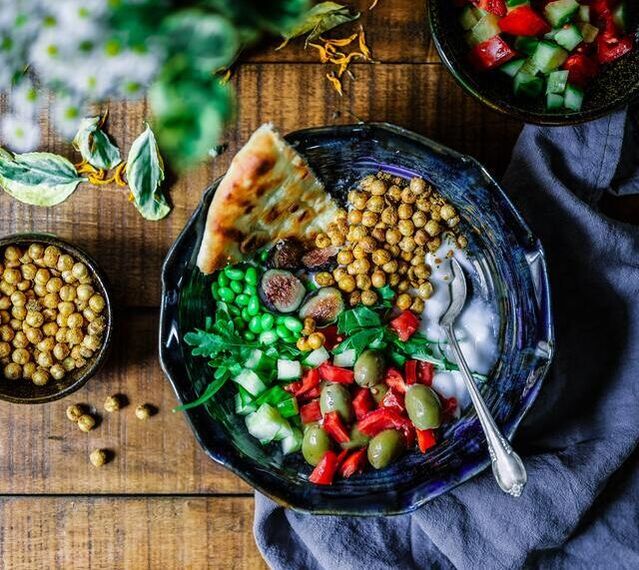|
"But where do you get your protein?"
I know, I know...if you've been vegan for any amount of time you may be tired of hearing this question, I am definitely with you, I've been answering it since 1993! However, I wanted to talk about protein today because I see such a wide range being recommended in the vegan community. I see recommendations for anywhere from 10-30% of calories from protein, or to put it in terms of ideal body weight, anywhere from 0.8-2.2g of protein per kg of body weight. With such a wide range being recommended, how do you know how much to aim for? The general consensus among vegan health professionals is that if you are eating enough calories, you will easily be getting more than enough protein. However, I did want to provide a few tips to help you determine where on the protein intake range you should aim for:
Now, to go back to that statement about not having to worry about your protein if you are eating enough calories, which I do agree with, but there are some things to keep in mind:
Some people may suggest that you'll need to eat more than the recommended amount if you are getting your protein from plants because plant protein is 'incomplete' or not as bioavailable. This is not the case, and you are actually better off getting your protein from plants:
In summary:
References: 1. https://academic.oup.com/nutritionreviews/article/77/4/197/5307079#135900070 2.https://www.ncbi.nlm.nih.gov/pubmed/28698222?fbclid=IwAR3XsCJ80KOVneV2SCaW7Tb0xyY2kjZsvS88daiQ2wKBasobAfhauru1dpw 3. https://www.sciencedirect.com/science/article/pii/B9780128039687000356 4. https://www.mdpi.com/2072-6643/11/11/2661/htm#B37-nutrients-11-02661 5. https://academic.oup.com/ajcn/article/77/1/109/4689641 6. https://www.ncbi.nlm.nih.gov/pubmed/9448181 7. https://www.ncbi.nlm.nih.gov/pmc/articles/PMC1774255/ 8. https://www.ncbi.nlm.nih.gov/pubmed/22055893 9. https://www.ncbi.nlm.nih.gov/pubmed/17475672 10. https://academic.oup.com/ajcn/article/72/6/1488/4729507 11. https://www.ncbi.nlm.nih.gov/pubmed/20461067 12. https://www.ncbi.nlm.nih.gov/pmc/articles/PMC4245565/ 13.https://www.acc.org/latest-in-cardiology/articles/2020/02/13/12/42/is-long-term-increases-in-tmao-associated-with-higher-chd-risk/ 14. https://www.ncbi.nlm.nih.gov/pmc/articles/PMC4081456/ 15. https://www.ncbi.nlm.nih.gov/pmc/articles/PMC3471136/ 16.http://hsph.jp/JT2009/documents/Caloric%20Restriction,%20the%20Traditional%20Okinawan%20Diet,%20and%20Healthy%20Aging.pdf 17. https://www.bluezones.com/recipes/food-guidelines/ 18. https://journals.plos.org/plosone/article?id=10.1371/journal.pone.0055030#s3 19.https://www.thelancet.com/journals/lanpub/article/PIIS2468-2667(18)30135-X/fulltext?fbclid=IwAR0-dtrAwN76mt_0SXYj6nx-IrJvQ_uo34Aee9AdHZzaSOz6oTBq4LkcpLo#.W3a67WTJrm0.facebook 20. https://www.ncbi.nlm.nih.gov/pubmed/12433724 21. https://www.ahajournals.org/doi/10.1161/JAHA.119.012865 22. https://nutritionfacts.org/video/too-much-soy-may-neutralize-plant-based-benefits/
7 Comments
1/16/2022 08:41:46 am
Thank you for sharing informative content. It means a lot to me hope you do more articles to post.
Reply
Shawna
1/16/2022 11:17:12 am
Thanks MckinneyVia ! Glad you enjoyed the article. I will definitely be writing more in the future. Feel free to sign up for my newsletter to get the next one.
Reply
2/24/2022 05:00:30 am
Excellent article! Your post is essential today. Thanks for sharing, by the way.
Reply
Joseph
10/10/2023 09:58:57 am
I was skeptical, but this product exceeded my expectations. Life-changing product. It's beneficial to all our health issues , awesome results - <a href="https://11d8bez76fw2ul5zqylmlk2g1q.hop.clickbank.net" target="_blank">click here</a> to begin your transformation!
Reply
Joseph
10/11/2023 05:24:13 am
I was skeptical, but this product exceeded my expectations. Life-changing product. It's beneficial to all our health issues , awesome results - <a href="https://11d8bez76fw2ul5zqylmlk2g1q.hop.clickbank.net" target="_blank">click here</a> to begin your transformation!
Reply
Joseph
10/11/2023 07:42:24 am
https://www.google.com/url?sa=t&source=web&rct=j&opi=89978449&url=https://www.liver.ca/blog/nutrition-cirrhosis-guide/&ved=2ahUKEwisiNWu--2BAxWumlYBHY0NAXM4ChAWegQICxAB&usg=AOvVaw2Kx3_-KpaVsVLpSJEeGk5X
Reply
Leave a Reply. |
AuthorShawna Barker BSc., R.H.N. is a nutritionist, vegan chef, college instructor, and an expert in plant based nutrition. She graduated with honours from the University of British Columbia with a Bachelors of Science degree in Food, Nutrition and Health, as well as the Canadian School of Natural Nutrition with a Diploma in Holistic Nutrition. ArchivesCategories |
Services |
Company |
|
The contents of this website are for informational purposes only and do not render medical advice, opinion, diagnosis, or treatment. The information provided through this website should not be used for diagnosing or treating a health problem or disease. It is not a substitute for professional care. If you have or suspect you may have a medical problem, you should consult your appropriate health care provider.

 RSS Feed
RSS Feed